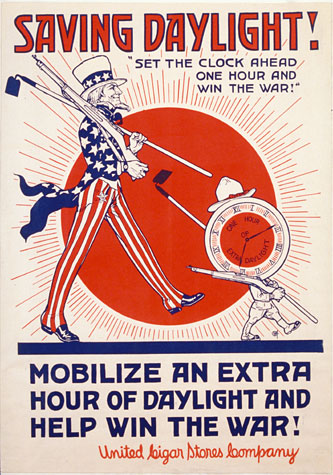 Unless you live in Arizona or Hawaii, then you’re probably still feeling the effects of Daylight Saving Time (DST), which officially started at 2 a.m. on Sunday and pushed all clocks in the United States forward an hour. As I was groggily crawling out of bed this morning I couldn’t help but think: Why on Earth do we use Daylight Saving Time? What started it all? So, being a curious sort of person I looked it up and was rather surprised.
Unless you live in Arizona or Hawaii, then you’re probably still feeling the effects of Daylight Saving Time (DST), which officially started at 2 a.m. on Sunday and pushed all clocks in the United States forward an hour. As I was groggily crawling out of bed this morning I couldn’t help but think: Why on Earth do we use Daylight Saving Time? What started it all? So, being a curious sort of person I looked it up and was rather surprised.
When I was a kid, someone told me that Daylight Saving Time (which we always incorrectly called “savings” time) was created for agricultural reasons. Something about giving farmers more time in the fields when it was light out. Others told me that it was created by Benjamin Franklin for similar reasons, but my father is convinced that Daylight Saving was simply so that companies could make more money as there was more light in which to shop. As it turns out, nobody was right.
Bear with me while I put on my writing and history caps for a moment here!
How Old is Daylight Saving Time?
According to several sources, Daylight Saving Time has been around since Ancient Times in some form or another, although never quite as official as we have now. Roman water clocks used different scales for different months of the year, and ancient peoples frequently adjusted their schedules to coincide with the sun.
In 1784, Benjamin Franklin wrote an essay to a local paper jokingly suggesting that Parisians could save candles simply by getting out of bed earlier and make use of the morning light, then going to bed earlier. This is, no doubt, why he is incorrectly connected with modern DST.
Daylight Saving Time was suggested again in 1895 in New Zeland, but a two hour shift was suggested and shot down. Then in 1905 William Willett proposed setting the clocks ahead 20 minutes on each of the four Sundays in April, then back again 20 minutes on each of the four Sundays in September–a total of eight DST switches a year. Thankfully, this was also not adopted–can you imagine the confusion?
A different model was proposed to British Parliament several times in 1909 but was opposed by many, and was never made into law. Interestingly enough, reports indicate that it was mostly farmers who were opposed to the time change. I guess that busts my childhood theory.
Daylight Saving Time Origin
 So when did it actually start? Well, the first official use of Daylight Saving Time was in Germany during WW1 and was adopted in 1916. Several other countries followed, including the United States in 1918 then again in 1942 for the second World War. The idea behind Daylight Saving Time was to minimize the use of artificial lighting to save money and resources for the war effort.
So when did it actually start? Well, the first official use of Daylight Saving Time was in Germany during WW1 and was adopted in 1916. Several other countries followed, including the United States in 1918 then again in 1942 for the second World War. The idea behind Daylight Saving Time was to minimize the use of artificial lighting to save money and resources for the war effort.
After WWII ended, there was a period from 1945 – 1966 where localities could choose whether they participated or not. This, of course, led to mass confusion as no one really knew what time it was. The Uniform Time Act of 1966 made Daylight Saving universal and stated that it would begin on the last Sunday of April and end on the last Sunday of October. However, states could be exempt by passing a local ordinance. Since then, it has been changed at least six times, including most recently in 2007.
Currently, Daylight Saving Time in the United States starts 2 a.m. in each local time zone (which means clocks turn back at a different time in each each zone) on the second Sunday in March and reverts back on the first Sunday in November. There are several US States and territories that are exempt from the time including Hawaii, Arizona, American Samoa, Guam, Puerto Rico, Virgin Islands and the Commonwealth of Northern Mariana Islands.
Personally, I always find it interesting to see how things were different in the past, especially for something so simple (or complicated, depending on how you want to look at it) as changing back clocks. While I remember the most recent change, which extended DST by a full month, I don’t really remember much of the others. How about you? Do you have any fun daylight saving time memories from when you were a kid? Share with us in the comments or join us in the forums!

Leave a Reply